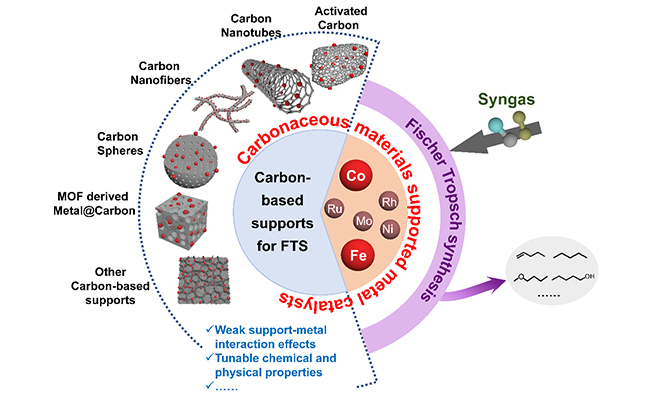Carbon-based Catalysts Used for Fischer-Tropsch Synthesis
Fischer-Tropsch synthesis (FTS) has experienced more than 90 years of academic research and 70 years of industrial application focusing on traditional supports, such as Al2O3, SiO2, and TiO2. How to design a more efficient catalyst corresponding with new technologies is still challenging.
Recently, a research team led by Prof. LIU Jian from the Dalian Institute of Chemical Physics (DICP) of the Chinese Academy of Sciences, in cooperation with Prof. Andrei Y. Khodakov from Unité de Catalyse et Chimie du Solide of Centre National de la Recherche Scientifique (UCCS, CNRS) commented the application of carbon-based catalysts for FTS.
These carbon-based catalysts include activated carbon (AC), carbon nanotubes (CNTs), carbon nanofibers (CNFs), carbon spheres (CSs), and metal-organic frameworks (MOFs) derived carbonaceous materials as supports.

Carbonaceous materials supported metal catalysts for FTS. (Image by CHEN Yanping and WEI Jiatong)
"We want to provide a critical and comprehensive progress regard carbon-based catalysts for FTS for researchers to quickly obtain an overview of this area," said Prof. LIU.
They summarized the current development about the application of carbon-based Co, Fe, and other metals (Mo, Ni, Rh, Ru) catalysts for FTS in detail, in terms of their special characteristics, as well as the comparison of catalytic performances of various carbon-based catalysts. Carbon-based materials could serve as inert supports to adjust the interaction between the active phase and supports, which was explored as promising alternative supports.
This study was published on Chemical Society Review on Jan. 4.
It was supported Liaoning Natural Science Foundation, LiaoNing Revitalization Talents Program, Dalian National Laboratory for Clean Energy (DNL), DNL Cooperation Fund.
Dalian Institute of Chemical Physics, Chinese Academy of Sciences
457 Zhongshan Road, Dalian, 116023, China
Tel: 86-411-84374221
E-mail: wangyj@dicp.ac.cn